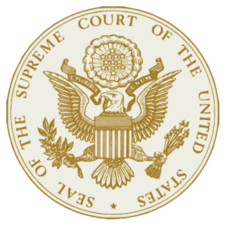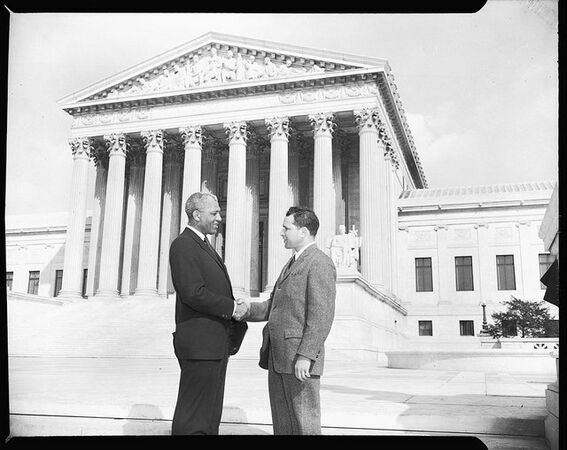Lamps Plus Inc. v. Varela
 | |
| Lamps Plus Inc. v. Varela | |
| Term: 2018 | |
| Important Dates | |
| Argument: October 29, 2018 Decided: April 24, 2019 | |
| Outcome | |
| Reversed and remanded | |
| Vote | |
| 5-4 | |
| Majority | |
| Chief Justice John G. Roberts • Samuel Alito • Clarence Thomas • Neil Gorsuch • Brett Kavanaugh | |
| Concurring | |
| Clarence Thomas | |
| Dissenting | |
| Ruth Bader Ginsburg • Stephen Breyer • Sonia Sotomayor • Elena Kagan | |
Lamps Plus Inc. v. Varela is a case argued before the Supreme Court of the United States on October 29, 2018, during the court's 2018-2019 term. The court reversed and remanded the United States Court of Appeals for the 9th Circuit. Writing for the majority, Chief Justice John G. Roberts said "[c]ourts may not infer from an ambiguous agreement that parties have consented to arbitrate on a classwide basis."[1] Click here for more information on the outcome. The case came on a writ of certiorari to the 9th Circuit.[2]
You can review the lower court's opinion here.[3]
Timeline
The following timeline details key events in this case:
- April 24, 2019: U.S. Supreme Court reversed and remanded the 9th Circuit's ruling
- October 29, 2018: Oral argument
- April 30, 2018: U.S. Supreme Court agreed to hear case
- January 10, 2018: Petition filed with U.S. Supreme Court
- August 3, 2017: Ninth Circuit affirmed the district court’s ruling stating that the class arbitration could move forward because of the ambiguity of the contract
Background
Frank Varela tried to file a class action complaint against his employer, Lamps Plus, after the company released his personal information in response to a phishing scam. He filed the lawsuit alleging negligence, breach of contract, and invasion of privacy. Citing the contract of employment signed by Varela, Lamps Plus moved to compel bilateral arbitration.[3][5]
According to an opinion from the 9th Circuit, “The district court found that the Agreement is a contract of adhesion and ambiguous as to class arbitration. It construed the ambiguity against the drafter, Lamps Plus, and compelled arbitration of all claims, allowing class-wide arbitration to proceed. On appeal, Lamps Plus argues that the parties did not agree to class arbitration.”[3]
The 9th Circuit affirmed the district court’s ruling stating that the class arbitration could move forward because of the ambiguity of the contract. Lamps Plus appealed to the U.S. Supreme Court, and the court agreed to hear the case on April 30, 2018.[3]
Questions presented
The petitioner presented the following questions to the court:[4]
Questions presented:
|
Outcome
In a 5-4 opinion, the court reversed and remanded the 9th Circuit, holding that under "the Federal Arbitration Act, an ambiguous agreement cannot provide the necessary contractual basis for concluding that the parties agreed to submit to class arbitration."[6] Chief Justice John Roberts delivered the opinion of the court.[1]
Opinion
In his opinion, the chief justice wrote, "Courts may not infer from an ambiguous agreement that parties have consented to arbitrate on a classwide basis."[1]
Concurring opinion
Justice Clarence Thomas filed a concurring opinion.
Dissenting opinion
Justice Ruth Bader Ginsburg filed a dissenting opinion, joined by Justices Stephen Breyer and Sonia Sotomayor. Justices Breyer and Sotomayor also filed separate dissenting opinions. Justice Elena Kagan filed a dissenting opinion, which Justices Ginsburg and Breyer joined, and which Justice Sotomayor joined as to Part II.[6]
Justice Ginsburg
In her dissent, Ginsburg wrote:[1]
| “ | I write separately to emphasize once again how treacherously the Court has strayed from the principle that 'arbitration is a matter of consent, not coercion.' ... [The FAA] was not designed to govern contracts 'in which one of the parties characteristically has little bargaining power.' ... In relatively recent years, [the court] has routinely deployed the law to deny to employees and consumers 'effective relief against powerful economic entities.' ... Mandatory individual arbitration continues to thwart 'effective access to justice' for those encountering diverse violations of their legal rights. [7] | ” |
Justice Breyer
In his dissent, Breyer wrote that the 9th Circuit "lacked jurisdiction to hear this case. Consequently, we lack jurisdiction as well."[1]
Justice Sotomayor
In her dissent, Sotomayor wrote:[1]
| “ | The Court today reads the FAA to pre-empt the neutral principle of state contract law on which the [9th Circuit] relied. I cannot agree. I also note that the majority reaches its holding without actually agreeing that the contract is ambiguous. ... This Court normally acts with great solicitude when it comes to the possible pre-emption of state law ... but the majority today invades California contract law without pausing to address whether its incursion is necessary. Such haste is as ill advised as the new federal common law of arbitration contracts it has begotten. [7] | ” |
Justice Kagan
In her dissent, Kagan wrote:[1]
| “ | In my view, the arbitration agreement Lamps Plus wrote is best understood to authorize arbitration on a classwide basis. But even if the Court is right to view the agreement as ambiguous, a plain-vanilla rule of contract interpretation, applied in California as in every other State, requires reading it against the drafter—and so likewise permits a class proceeding here.[7] | ” |
Text of the opinion
Read the full opinion here.
Audio
- Audio of oral argument:[8]
Transcript
See also
External links
- U.S. Supreme Court docket file - Lamps Plus Inc. v. Varela (petitions, motions, briefs, opinions, and attorneys)
- SCOTUSblog case file for Lamps Plus Inc. v. Varela
Footnotes
- ↑ 1.0 1.1 1.2 1.3 1.4 1.5 1.6 1.7 Supreme Court of the United States, Lamps Plus, Inc., et al. v. Varela, April 24, 2019
- ↑ Supreme Court of the United States, "Lamps Plus Inc. v. Varela," accessed September 29, 2018
- ↑ 3.0 3.1 3.2 3.3 3.4 SCOTUSblog, "Lamps Plus Inc. v. Varela," accessed September 29, 2018
- ↑ 4.0 4.1 Supreme Court of the United States, "17-998 Lamps Plus Inc. v. Varela," accessed September 28, 2018
- ↑ Oyez, "Lamps Plus Inc. v. Varela," accessed September 29, 2018
- ↑ 6.0 6.1 SCOTUSblog, "Lamps Plus Inc. v. Varela," accessed April 24, 2019
- ↑ 7.0 7.1 7.2 Note: This text is quoted verbatim from the original source. Any inconsistencies are attributable to the original source.
- ↑ Supreme Court of the United States, Lamps Plus Inc. v. Varela, argued October 29, 2018
| |||||||||||












